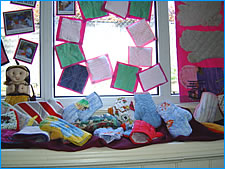 Making DT Work
Making DT Work
Areas for Development
- There is very little evidence of control technology work happening in KS1 or 2. This is contrary to the statutory requirements of the National Curriculum. In KS2 pupils' experiences of using electrical components to achieve functional results is quite limited. While there is evidence of pupils using simple mechanisms to produce different types of movement these experiences are most effective when pupils use mass produced kit components to supplement their own ideas rather than having to go through the laborious process of making their own cogs and gears which often don't work properly.
- The evaluation exercise invariably happens as an end of design activity based upon the pupils' likes and dislikes regarding the finished product. Effective evaluation should be an on-going process that allows pupils the opportunity to evaluate during the stages of construction to test theories, ideas and materials. Effective evaluation should allow the pupils to make a judgement regarding the functionality of their products and how effective is the outcome in relation to the criteria set in the initial design brief.
- There is a strong tendency for the work observed in all key stages to be too teacher directed. Subsequently the key elements of enquiry and creativity which contribute hugely to effective design and technology learning are often stifled. High quality learning more often than not happens through the pupil's involvement in the process, and this may not necessarily be reflected in the quality of the product. In the schools we judged to be best at providing design and technology experiences, pupils' were allowed to fail and design briefs sometimes proved to be unsuccessful.
- The making of prototypes to test initial thoughts and as a stimulus for pupils' creativity is underdeveloped.
- Arrangements to assess pupils' progress in design and technology within the primary phase are currently underdeveloped, and hamper colleagues in taking note of prior attainment to set appropriately challenging work. The use of ACCAC's optional assessment material is strongly recommended at KS2.
- Some lessons observed in KS2 and KS3 lacked challenge and pace and some classroom activities could have been set as a homework task to support a more challenging class activity.
- There is often a close relationship between the NC subjects of design and technology and art. There is however some evidence to suggest that decorative products are made under the guise of design and technology when those products are best described as being works of art. Pupils need to consider the functionality of their products and does the design process allow them to make another identical or similar product. Pupils also need to empathize with the needs of the consumer when researching, designing and making their products.
- The quality of group work varies widely in the schools we visited. In some examples the group dynamic resulted in lively debate and discussion, however more often than not group work results in four or five individuals working separately on a common assignment and taking turns to perform certain tasks in relation to that assignment.
- Schools need to ensure that pupils have the opportunity to record their work in a variety of ways in order to allow pupils the choice of communicating their ideas in a way that doesn't confine their enthusiasm for the subject.
| Back to Subject Reviews |

